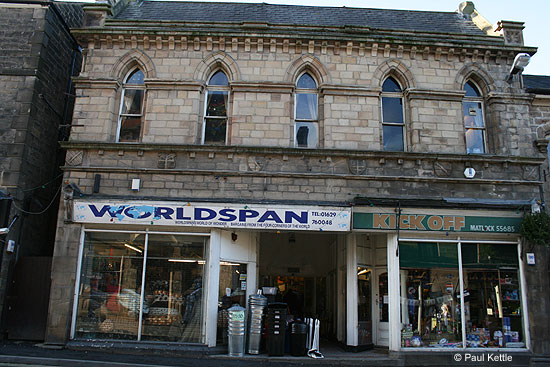|
Images Index> 20th & 21st Century, Matlock> This page |
| Matlock's Market Hall, Dale Road |
| Matlock : Twentieth Century Photographs, Postcards, Engravings & Etchings |
|
|
||||||||||||||||||||
The opening ceremony, followed by a public dinner for about 100 people, took place on Monday 18th May 1868, when "the weather was everything that could be desired for the occasion". It was advertised that Lord Geo. Cavendish, the local M.P., would grace the event but he was unable to absent himself from the House so the Mayor of Derby, Alderman T. Rowe, stepped in. The band of the 11th Derbyshire (Matlock) Rifle Volunteers greeted Alderman Roe at the station and there was then a procession. The building was inspected before the Mayor of Derby declared the building open. Dinner in the Assembly Room followed at 3p.m. with a "sumptuous repast" catered for by Mr. Langley of the Queen's Head. Then followed various speeches, with toasts and a great deal of congratulating. Alderman Roe expressed the hope that the Market Hall would prove as successful as the one in Derby, despite some residents having been extremely reluctant to take shares in the company. John Smedley's name must have been in everyone's mind as the audience laughed and cheered at comments made over his refusal to take shares in and support the project "because of the Queen's Head adjoining; but he could have come there without drinking beer"[2]. Smedley was, of course, teetotal. On the following evening there was an inaugural concert, again with the band playing. The music was clearly extremely loud inside the hall as the crowd outside were able to hear easily and it was the preferred option! Performers were: Madlle. Bertha Brouzil, a violinist who was accompanied by her sister; Mr. Hendley, a tenor whose performance was unfortunately disturbed; Miss Woodward and Mrs. Thompson were also vocalists; Mr. Woodward gave a clarionet solo; Mr. Scott played both the harmonium and the piano. Celebrations continued into the next day, with a tea meeting and concert to raise funds for the choir at Matlock House.[2] [3] "The building, in the style known continental gothic, consists of a market hall, an assembly room, banking rooms, and a suite of offices. The hall has twelve shops arranged along two sides, with glass fronts, external and internal shopboards, and two rows of benches or open stalls down the centre. The assembly Room is approached by a wide stone staircases from the entrance vestibule of the market-hall, and a similar staircase from the lobby of the offices. It is capable of seating 500 persons. The whole of the walls are of gritstone, with dressed face to the street front and rock face to the side walls, and dressed stone to the windows and doors. The carved work of the front is of Darley white stone. The works are from the designs of and have been carried out under the direction of W. Hull, Esq., architect, of Northampton. The building has been let to separate firms. The carving is by Mr. W. White, jun., of Northampton. The assembly-room is a well-sized structure, and its acoustic properties are very favourable".[2] [3] Shops were let by a Public Auction held in the Assembly Room on
15th May[3].
Below are quotations from two books about Matlock that mention
the Market Hall.
It was not until 1888 that important improvements and additions were made to the Market Hall and Queen's Head Inn and a celebratory supper way laid on at the Queen's Head, then under the management of James Blackshaw. He was also the lessee of the Assembly Rooms. "The cost of the spread was kindly defrayed by the owner of the property, Mr. John Smith (later Sir John Smith) of Derby. John Nuttall had made the plans and supervised the improvements"; he was also in the chair. There were 60 people present including the contractors Messrs. Bridge, Duckmanton and Robinson[9]. Can you help identify these coats of arms? Various sources have been checked but the arms do not seem to belong to the ancient Matlock families.
|
|||||||||||||||||||||
|
Photograph of the old Market Hall kindly provided for this website by and © Paul Kettle and the shields by an unnamed contributor. Information researched by and © Ann Andrews. Intended for personal use only. The webmistress is deeply indebted to the librarians at County Hall Local Studies Library in Matlock for providing me with photocopies of "The Matlock Visitor" (8- 22 May 1868) as I'd been unable to read this publication at Colindale. A special thanks to Colin Goodwyn for suggesting which issues to check and for some extra information. |
|||||||||||||||||||||
|
[1] "Derbyshire Advertiser and Journal", 26 April 1867. Laying the Foundation Stone of Matlock Market Hall. The stone was laid by Alderman Roe of Derby with a trowel engraved with the words: "Presented to Alderman Roe, on the occasion of his laying a foundation stone of the Matlock Bridge Market Hall, April 22, 1867". A bottle containing the county papers and a few coins were placed with the stone. [2] "The Matlock Visitor", Friday 22 May 1868. Report of the opening of the New Market Hall and Assembly Room. [3] "The Matlock Visitor", Friday 15 May 1868. Advertisement of the Public Opening, the Public Dinner, the Public Auction and the Grand Evening Concert. [4] TNA: BT31/1227/2910C for the Matlock Bridge Hotel & Market Hall Co, incorp. on 12 March 1866. Researched by Colin Goodwyn. [5] Additional information researched by Colin Goodwyn. [6] "Black's Tourist Guide to Derbyshire" (1888) pub. Adam and Charles Black Edinburgh. [7] Bryan, Benjamin (1903) "History of Matlock - Matlock, Manor and Parish" London by Bemrose & Sons, Limited. [8] See The London Gazette 15 April 1884 elsewhere on this website. [9] "Derbyshire Times",
30 January 1886. |
|||||||||||||||||||||











